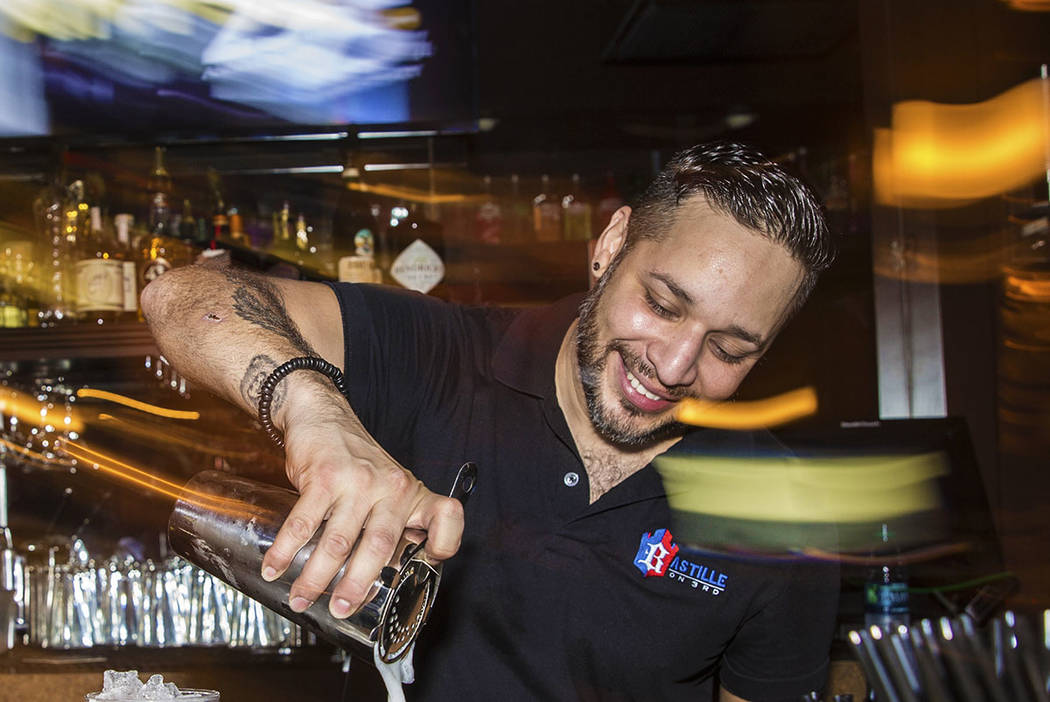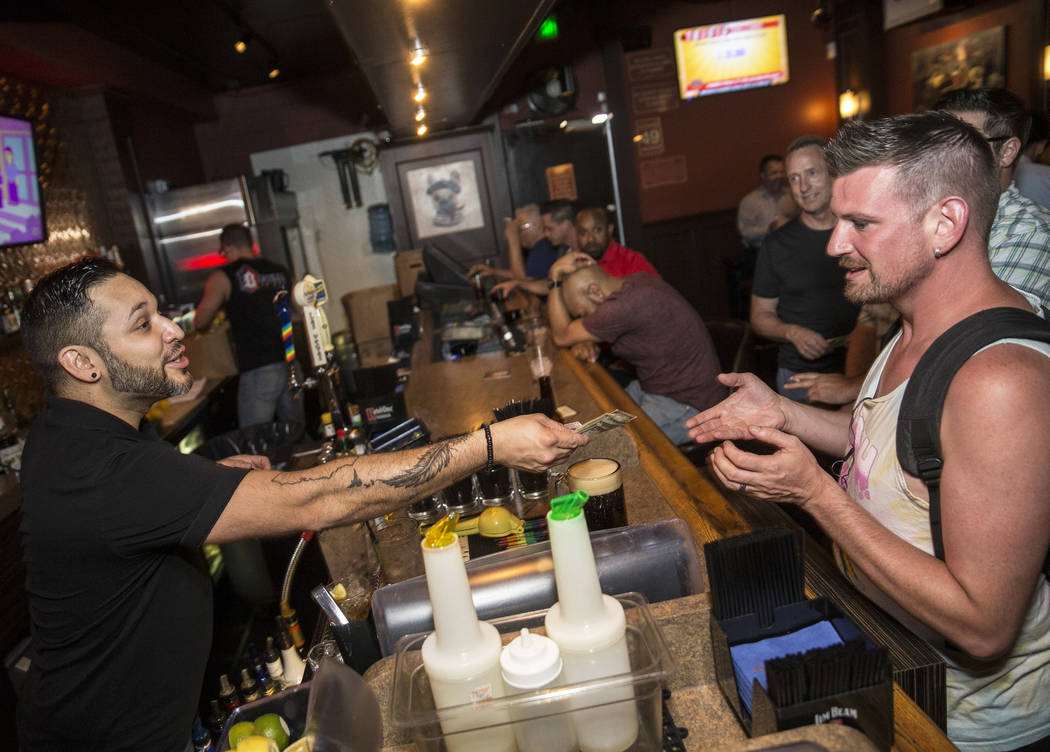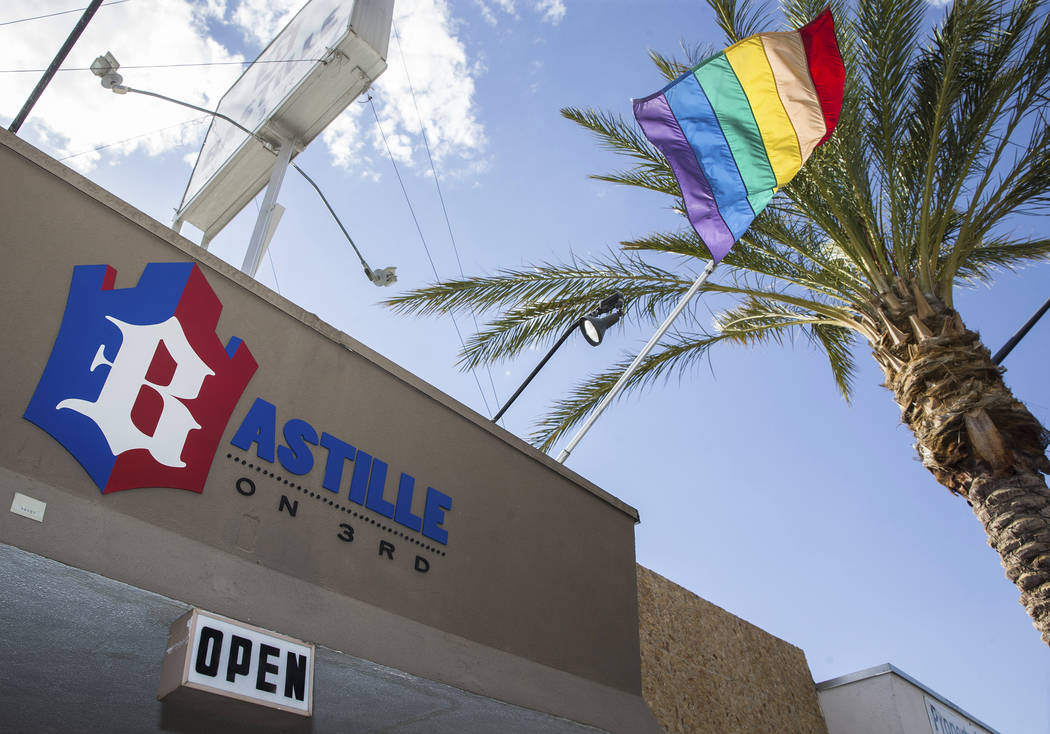Landmark LGBT bar closing as downtown Las Vegas rents rise
In a pale blue plaid shirt and wide-brimmed cowboy hat, Skip Meoli only breaks his stillness to sip a cool bottle of Dos Equis.
By himself, the 78-year-old sits in a high-top booth, surveying the crowd. To his left, people illuminated in a royal blue glow poke at gaming-machine screens. To his right, two men drink wells and talk about work.
Meoli is quiet, though, content with his cold beer. He’s been coming to this dark, LGBT-owned and LGBT-friendly dive bar named Bastille on 3rd at least two nights a week since 1977, a year after it opened under its original name, Snick’s Place.
On Saturday, three weeks into Pride Month, it will close for good — four months after it was sold.
It is believed to be the longest continually running LGBT bar in Las Vegas, and newspaper archives seem to indicate that’s true. The archives aren’t too detailed about LGBT bars, though.
The only indication that Snick’s opened is a mention in an otherwise routine story about various Las Vegas businesses in 1976 either receiving liquor licenses or undergoing changes of name and ownership.
“Ralph Vandersnick has purchased the tavern from Paul and Geraldine Fellabaum and has renamed it Snick’s Place,” the story reads, referring to the bar, once called Mug N’ Jug, that still sits at 1402 S. Third St. It provides no other details.
Vandersnick died in 2000. Originally from the small town of Atkinson, Illinois, he served with the U.S. Army in Germany during World War II, according to his obituary. When he returned to Atkinson, he opened the first version of Snick’s Place, which he ran for four years before moving to Las Vegas and opening the institution that still stands today, for one more day.
Meoli didn’t know Vandersnick personally, but he can still picture him sitting at the table where the two men are now talking about work. The old owner liked to hang out and chat and laugh, Meoli said. He owned Snick’s until he died.
A man named Dominick Vitale took over afterward, operating Snick’s until about 2014. Robert Largo took over next, and the bar became Bastille. Largo also owns The Garage, an LGBT bar in the southeast valley.
New owner
When reached Friday, Largo said it was a difficult time for him and his staff, and he declined an interview request.
The bar is closing because he was unable to come to terms on a lease with the new owners, Largo said, adding that he harbors no hard feelings toward them and hopes they “do something good with the property and for downtown.”
Lance Johns, the new owner, heads another Las Vegas institution: Atomic Liquors, located at 917 Fremont St.
The dive-bar-turned-hot-spot celebrated its sixth anniversary Thursday under Johns’ direction, though it is often referred to as the longest continually running bar in Las Vegas history — a spot where lore says people once gathered on the rooftop to watch mushroom clouds climb into the sky as atomic tests took place in the far-off desert.
Johns is excited about his new $1.35 million acquisition, which went through in February. The sale swallowed three other properties next to where Bastille now sits: a ballet studio that already moved, a nondescript business that appears closed and a printing shop that offers notary and tax services.
“Their rents are severely under market rate,” Johns said of the current businesses. “That kind of is the reason for this change in tenant mix over there.”
He plans to host four new food-and-beverage businesses, one of which will be a personal project. It’ll be nothing like Atomic, he said, without offering more details. The first of four likely will be open by the end of the year.
Asked whether any of the new businesses will be an LGBT bar like Bastille, Johns said no.
“The economics of it doesn’t work right now,” he said. “But just like Atomic, we’re very LGBT-friendly. I wouldn’t see anything over there that wouldn’t be approachable, friendly, welcoming to the LGBT community. But would it be exclusively that use? No.”
The loss makes downtown Las Vegas and the Arts District a desert for LGBT bars. Mingo Kitchen &Lounge, an LGBT-owned Mexican restaurant, also announced its closure this week.
“This is the 50th anniversary of Stonewall, and obviously this is Pride Month, so it’s kind of ironic that this is happening,” said Vince Collins, director of operations at The Gay and Lesbian Community Center of Southern Nevada.
Stonewall refers to the riots that started after a June 1969 police raid at the Stonewall Inn in New York City and sparked several days of demonstrations that led to the modern LGBT rights movement.
Collins said it’s good that Johns is acknowledging that whatever comes next will be an LGBT-friendly place. He hopes that it promotes itself in that way, too — even by putting a pride flag in the window.
“Just to indicate that this is a safe space for everyone,” he said. “Our community, we deal with a lot of adversity, so taking the extra step to let people know that it’s OK to be yourself in our establishment is really important. We don’t take that lightly.”
Emil Vondriska, a 20-year regular at Bastille, said he was happy when he learned the man who owns Atomic bought the bar he still calls Snick’s.
“I thought, ‘Oh, he cares about history,’ ” Vondriska, 58, said. “I thought that they would let the bar continue on under the current owners.”
Instead, he bought two-for-one drinks Wednesday with his husband for one of the last times.
Shifting culture
Collins noted that the bar’s loss comes at a time when LGBT culture is changing, too.
“The younger generations of people, they tend to sort of not necessarily need to go to a gay-specific bar, and a lot of pop-up events happen,” he said. “So there’s a shift with that. Some people are OK with not having a designated place.”
But Meoli, the man in the cowboy hat, is not one of those people.
He’s been to plenty of LGBT bars around town. He listed their names off in between swigs of beer, counting with his fingers to keep track. But this is his favorite.
“I always liked this bar because it’s more intimate,” Meoli said. “I like a more old-time saloon type of bar. Those other bars are a big room, but I like something that’s close. You can see everybody.”
When he had a car, he’d venture off to others, but Meoli always came back. He doesn’t have a car anymore, though, and a bus is too much effort for a beer, he thinks. So he puts on his boots and walks the short distance to Bastille.
“After this bar closes, I don’t know where I’ll go,” he said.
Meoli grew quiet, finishing his beer. Done, he tossed the bottle in the trash, moseyed toward the back door, turned around and paused for a while. Then he slipped outside, tipping his hat into the bright afternoon light.
Contact Rachel Crosby at rcrosby@reviewjournal.com or 702-477-3801. Follow @rachelacrosby on Twitter.




















